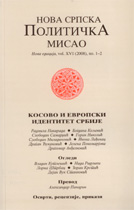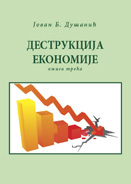| NSPM in English | |||
There is No Miracle for Serbia |
 |
 |
 |
| недеља, 14. новембар 2010. | |
 Ever since the end of the Balkan wars of the 1990s, many people in Serbia have lived in the hope that Serbia’s “salvation” lies in membership in NATO and the European Union. These leaders have become hypnotized by the hope that membership in the so-called Euro-Atlantic community will provide the miracle Serbia needs to attain security and prosperity. Their eyes are fixed on Brussels and Washington. But, the hoped for miracle will not happen, even if Serbia one day becomes a member of NATO and the EU. Such an assessment raises two fundamental questions. Ever since the end of the Balkan wars of the 1990s, many people in Serbia have lived in the hope that Serbia’s “salvation” lies in membership in NATO and the European Union. These leaders have become hypnotized by the hope that membership in the so-called Euro-Atlantic community will provide the miracle Serbia needs to attain security and prosperity. Their eyes are fixed on Brussels and Washington. But, the hoped for miracle will not happen, even if Serbia one day becomes a member of NATO and the EU. Such an assessment raises two fundamental questions.
First, why do so many people in Serbia believe in such a miracle? Most importantly, I think, is the great weight of history. The Balkans, including Serbia, has long been economically the poorest region of Europe and politically the most stunted in its development. The Industrial Revolution began in northwestern Europe and, for a variety of reasons, had less influence the further south and east one travelled in Europe. Eastern Europe, including the Balkans, remained overwhelmingly rural, agricultural and poor while northwestern Europe grew wealthy. At the time of the Industrial Revolution, some of countries in northwestern Europe already had been colonial powers for more than 200 years. The great wealth generated by industrialization allowed them to consolidate power and expand their empires even further. At the same time, great imperial powers arose to the south and the northeast of the Balkans. Ultimately, the Balkans became the crossroads of these mighty empires. Throughout this history, the Balkans never was important to the imperial powers for indigenous reasons (sui generous). But, the region was important as it affected the interests and power of the great empires. The Balkans was where those empires all met and where they often fought to secure their interests and consolidate their power. Consequently, through several hundred years of external domination, the economic and political development of the Balkans never was allowed to advance “normally.” Domination by the imperial powers of northwestern Europe was challenged by imperial Russia and then the Soviet Union, Austria-Hungary and the Ottomans. The Balkans was the common “playground” for all of these powers. Ironically, the only time since the Middle Ages when a portion of the Balkans has been largely free of outside domination was during the Yugoslav period under Marshall Tito. However, when Tito’s Yugoslavia collapsed, the old imperial model of external domination reemerged. This time Serbia—and the rest of the Balkans—saw the return of northwestern Europe as well as the United States. The stage was set for the return of imperial domination during the wars of the 1990s and has grown stronger ever since. Despite the fact that 15 years have elapsed since the Balkan conflicts ended, Brussels and Washington have tightened their grip on the region. Today, Brussels and Washington “sit on the Balkans” as certainly as any imperial power of the past and what they say must be accepted as truth. They define what political and economic community must look like in the Balkans. At the same time, this long history of domination by others has established a psychology of “willing victimhood” in the Balkans. As a result, the people and leaders in the Balkans have learned to look to others for answers. There is a fear of accepting responsibility, a fear of independent action, a rejection of the idea that it is possible for the people and leaders in the Balkans to chart their own futures. Many people and leaders in the Balkans have been so conditioned by centuries of external domination that they are intimidated by Western officials. And, of course, Brussels and Washington have taken advantage of this psychology of victimhood by insisting that the Balkans must conform to their will. The propensity to do the bidding of others has been especially evident in the current government in Belgrade. Usually, this intimidation usually comes from Western embassies, but it is also the result of pressure from officials visiting the region from northwest Europe and Washington. One could cite many examples, but just think about the visit of U.S. Vice President Biden in August 2009, the visit by German Foreign Minister Westerwelle in August 2010 and the visit of U.S. Secretary of State Clinton in October of this year. Each of those visits was heavy-handed, officious, almost imperial and each of these visitors demanded that the people and leaders in the Balkans must abide by what they are told if they want to be truly free and prosperous. And, too many people and leaders in the Serbia were mesmerized, falling willingly in line. And, what is the message that Brussels and Washington have delivered to Serbia and, indeed, all of the Balkans? It is clear—if Serbia and the rest of the Balkans want to “join the West” there are only two vehicles they can use: NATO and the EU, the so called Euro-Atlantic Community. But, in the contemporary world there are major problems with these two organizations. During the Cold War there really was a “Euro-Atlantic Community,” because of the existence of the common Soviet enemy. But, with the end of the Cold War, this “community” hardly exists anymore. It is now only a rhetorical reality that lives mostly in the minds of American policy makers. In the U.S. we cling to the past because that is where our greatness was. But, because of the psychological dependency Serbia, this myth continues to live there as well. Many people and leaders in Serbia, and throughout the Balkans, continue to believe there is a Euro-Atlantic community because American policy makers tell them that there is such a thing and that membership in that community will provide salvation for the Serbia. In reality, despite the recent NATO conference in Belgrade, NATO has become essentially irrelevant. Who, exactly, is the enemy that NATO protects us from? NATO has become an alliance without a purpose, except to perpetuate its own existence. NATO lives essentially on inertia. It is form for form’s sake. One must wonder why NATO membership would be in Serbia’s interest. What exactly would Serbia get from such membership? NATO cannot even convince all of its members to engage in combat in Afghanistan, a situation that is covered under Article 5 of the NATO Treaty. If NATO can’t fight as a full alliance in Afghanistan of what use is it as a security organization? Certainly, the EU is a different matter. There is value in Serbia association with the EU, but Serbia needs to consider very carefully what the nature of that association should be. Today the EU is a far different organization from what it was just ten years ago. The EU today is a multi-level organization, with first rank members and second and third rank members. Clearly, Serbia would be, at best, a third rank member. The contemporary EU is too large, diverse, cumbersome and weak to function efficiently or in the interest of every one of its 27 members. The EU is a financial cripple, a situation that has been made even worse by the world financial crisis. The recently established European Financial Stability Facility, which is designed to help failing national economies, is a sign of weakness, not strength. Politically, the EU does no where it wants to go, how many levels it will sustain and how large it will be. And, the first rank members are now seriously considering a regime of formal sanctions against members who “break the rules.” Bulgaria already is under sanctions and Romania could be sanctioned in the near future. The European standard of “conditionality” is presented as a means to ensure that prospective members meet EU standards. But, “conditionality” is used more often as a technique to keep prospective members out of the EU than to bring them in. Just ask the Turks, who first began negotiations with the EC/EU 47 years ago! Still, Western policy makers tell Serbia—and all of the Balkans—that their salvation can be found only in membership in the EU and NATO. And again, many people and leaders in Serbia and throughout the Balkans, intimidated and mesmerized by their psychological dependency on Western policy makers, buy onto this propaganda without thinking. This became obvious late last month when EU foreign ministers decided to undertake a preliminary investigation of Serbia’s qualifications for EU membership. Although many in Serbia “celebrated” this decision as a step forward, the foreign ministers’ decision did not move Serbia any closer to EU membership. It was an empty gesture that was designed primarily as a boost for the Tadic government, while providing Serbia nothing. While there is no obvious reason why Serbia should join NATO, there still is good reason for some sort of an association with the EU. But, perhaps instead of full, formal membership, it would be more beneficial to establish an arrangement based on specific and very carefully and more narrowly defined economic, trade and financial interests. This way, Serbia might be able to realize the benefits of such an association, while avoiding the pitfalls and dangers of full membership. It perhaps might make more sense for Serbia to follow a “multi-vector” approach. That is, in addition to constructing specific contractual arrangements with the EU, Serbia should also look hard at economic, financial and security relationships with many other countries and regions, including Russia, Iran, China, Japan, Brazil, etc. This way, Serbia would structure relationships that fit its interests rather than follow the self-serving advice of Western policy makers. (Dr. Meyer is a Professor of National Security Studies and Political Science at the National Defense University in Washington, D.C. ) The view expressed here at those of Dr. Meyer alone. |
Од истог аутора
Остали чланци у рубрици
- Playing With Fire in Ukraine
- Kosovo as a res extra commercium and the alchemy of colonization
- The Balkans XX years after NATO aggression: the case of the Republic of Srpska – past, present and future
- Из архиве - Remarks Before the Foreign Affairs Committee of the European Parliament
- Dysfunction in the Balkans - Can the Post-Yugoslav Settlement Survive?
- Serbia’s latest would-be savior is a modernizer, a strongman - or both
- Why the Ukraine Crisis Is the West’s Fault
- The Ghosts of World War I Circle over Ukraine
- Nato's action plan in Ukraine is right out of Dr Strangelove
- Why Yanukovych Said No to Europe

.jpg)




















